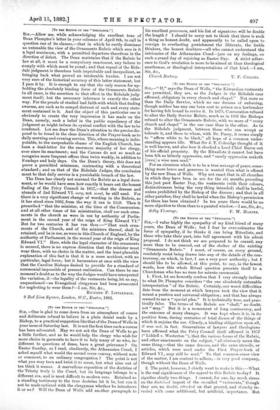[To TIM EDITOR OF THE "SPECTATOR."] SIR, —One is glad
to come down from an atmosphere of coarse and deliberate refusal to believe in a plain denial made by a Bishop, to a practical suggestion like that of the Dean of Wells in your issue of Saturday last. It is not the first time such a course has been advocated. May we not ask the Dean of Wells to go a little further, and as he would help the clergy who wish for more choice in garments to have it to help many of us who, in- different to questions of dress, have a great grievance ? On Easter Sunday, as I read, obediently, the Athanasian Creed, I asked myself what would the second verse convey, without note or comment, to an ordinary congregation ? The point is not what you may turn and twist it to mean, but what nine out of ten think it means. A marvellous exposition of the doctrine of the Trinity truly is the Creed, but its language belongs to a different era, and is most difficult to modern ears. Retained as a standing testimony to the true doctrine let it be, but can it not be made optional with the clergyman whether he introduces it or no ? Will the Dean of Wells add another paragraph to
his excellent gravamen, and his list of signatures will be double the length ? I should be sorry not to think that there is such a thing as honest doubt, and apparently to be called upon to consign to everlasting punishment the illiterate, the feeble thinkers, the honest doubters—all who cannot understand the intricacies of the Athanasian Creed—jars on my feelings, on such a grand day of rejoicing as Easter Day. A strict adher- ence to God's revelation is more to be aimed at than theological anathemas, or theological interpretations of that kind.—I am, Sir, &c.,


































 Previous page
Previous page